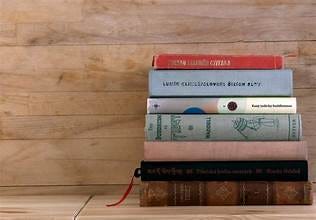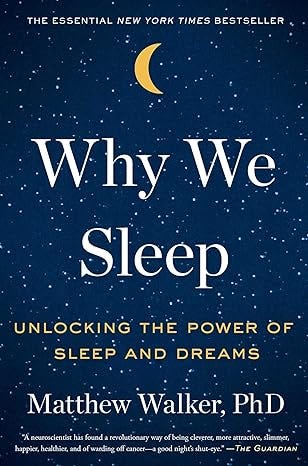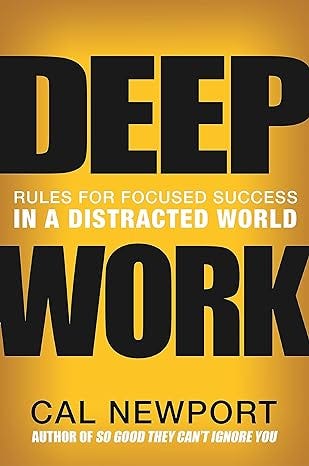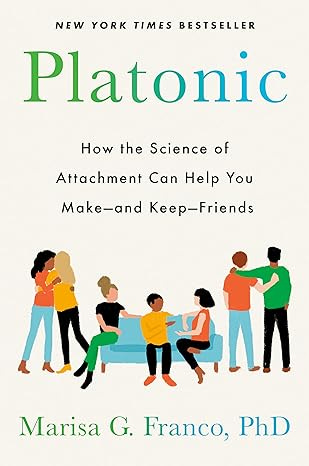Don’t get used to this, but I have another video for you. Two things before you watch:
My son did the captions this week. He said this style is very “TikTok” and designed to keep the viewer engaged. Either that, or trigger a migraine. You decide.
And, if you watch until the bitter end you’ll be able to hear me chuckle at the injured seal in the background - also my son, who somehow can produce this sound and enjoys making it at the end of everything he films. This is what I’m dealing with.
Let me know what you recommend. I’m hoping that collectively you pick my reading list for the rest of 2024.
There are three things I look for in a non-fiction book. Each of my recommendations checks these boxes.
Sound evidence. In this case, all three are written by academics with deep knowledge of their subject and lots of data.
Engaging storytelling. I want to learn, but I read to decompress, so it can’t be a slog.
Practical tips. I am always on the hunt for low-effort ways to live better.
If you enjoy these types of books, too, then you will definitely enjoy these three.
Why We Sleep by Matthew Walker
This is the most habit-changing book I’ve ever read. It’s the densest read of the three, but it’s worth it.
In short, if you’re not sleeping eight hours a night, don’t even bother doing anything else that’s “healthy.” If you want to skimp on sleep, you might as well smoke a pack of cigarettes, gorge yourself on an all red-meat diet, and wash it down with a fifth of whiskey.
And if you think you’re one of those people who can get by on six hours, think again. Walker, a sleep scientist from UC Berkeley, debunks this myth. The percentage of people who can perform on less than eight hours of sleep without suffering from cognitive decline is VERY small. If you haven’t won Powerball yet, you’re probably not one of them—you’re just not that lucky.
I have always been a great sleeper. In fact, my most common response to stress is to go to bed, which has served me very well in life. I’m also a napper. I rarely get to do it, but I love a good nap when it happens. Turns out I’m not just lazy—Walker explains that traditionally humans would sleep twice a day until modern scheduling killed the nap.
But even as a pro sleeper, I still skimp on sleep many nights in favor of just checking “one more thing” off my to-do list.
This is why I am particularly worried about women. We disproportionately shoulder the office housework at work and the mental load of family scheduling at home. The time for those extra duties has to come from somewhere, and stealing from your sleep is the choice that makes the most sense in the short-term.
Reading this book convinced me it’s not worth it. There’s nothing on my to-do list that’s worth a premature death.
Before this book I used to go to bed whenever I couldn’t stay awake a minute longer, and figure out how many hours I got to sleep until I had to wake up.
Now I work backwards—I think about what time I need to get up the next day and calculate what time I need to go to bed to get enough sleep. I’m nowhere near perfect, but I’m much better than I was.
Deep Work by Cal Newport
This is the quickest read of the three—you can probably finish it on a long airplane ride.
This is a book about getting shit done.
How many times have you worked all day only to find that it’s 6pm and you haven’t even started any of the “real work” you had planned to do? You spend an absentminded dinner with your family, anxious to resume work once they go to bed. You stay up too late tackling some of it, but fall asleep at your desk before you finish, and wake up groggy the next day vowing not to repeat this cycle—until you do.
Newport, a computer science professor at Georgetown (and also a fellow Dartmouth alum, woot woot), writes about the science and practice of productivity.
Deep work is that flow state we all seek—working on the most important tasks without distraction. When we can’t work deeply, we work too long, sleep too little, and feel like we never get to relax.
Again, this isn’t a problem unique to women, but evidence suggests that women are burdened by more distractions. We are saddled with more “non-promotable work” than men—work that helps our organizations but does nothing to advance our careers.1 And if you’re the school emergency contact in your family, like I am, you never even feel that you can work with your phone off—just in case you get the dreaded call from the school nurse.
Newport gives highly practical suggestions on how to achieve deep work. Some of my favorites are the concept of “fixed time productivity” and a daily shutdown ritual. I’d tell you what they are, but that would spoil the fun of reading the book.
Before this book I was addicted to all kinds of distractions, like working with my email open and excitedly checking it every time I heard the ding (for what, I’m not sure…it’s just always more work)
Now I practice time blocking (a practice recommended by Newport)2, and if I really need to get something done I close my email and silence my phone. And yes, I do miss calls from the school nurse sometimes, like I did this week. But guess what, they figured it out without me.
Platonic by Marisa Franco
When you start making time for deep work, you’ll be sleeping eight hours a night and still have time to spare. What should you do with your newfound time? Invest in your friends!
This is another thing I’ve always done pretty well. As just one example, my college girlfriends and I get together at least once a year (often twice)—which I find impressive given that almost all of us have kids and big jobs, live in cities all across the country, and graduated over 25 years ago.
In contrast, I’m amazed by the number of women who tell me that they’re finally going on their first girls’ weekend since they had kids—and their oldest is ten.
Although this seems unfathomable to me, I’m far from perfect in the friendship realm. Setting work down to meet a friend for lunch or coffee sometimes often makes me feel guilty that I didn’t accomplish more that day. And time with friends is the first thing I cut when work and life are more than I can handle.
But just like with exercise, I’ve never regretted a single moment I made time for my friends. I have, however, regretted many of the times I didn’t.
Franco, a psychology professor, shines a light on the science of platonic friendships—why they are critical to our happiness and how we can have more of them.
Spending time with friends isn’t frivolous. It doesn’t make you a bad mom, spouse, or employee. It’s the best form of self-care there is (after sleep, of course). If you don’t believe me, Franco will convince you.
Before this book my time with friends was one of my biggest sources of mom guilt (much more than time away for work).
Now I’ve let that guilt go. Friends are nonnegotiable. And modeling friendship for my kids is as important as modeling study habits, work ethic, healthy eating, or any of the other things I try to teach them (while they roll their eyes).
If you’re not in a place where you can make time to read or listen to books right now, I see you. Don’t worry, this season will pass.
But when you’re ready, I hope that these books will add as much benefit to your life as they have to mine.
And because I care about preserving time for your sleep, work, and friends, here are the links to buy these books on Amazon if you’re so inclined. You’re welcome.
If you’ve read this far, I consider you a superfan. If you want to share the love, I’d be giddy if passed a note to your friends in third-period French.
Cheers to success, friends!
Linda Babcock, Brenda Peyser, Lise Vesterlund, and Laurie Weingart The No Club: Putting a Stop to Women’s Dead-End Work
https://www.timeblockplanner.com/








Love this and hope you keep the videos coming (although hard no for me on the captions 😂). I'm interested in check out all these books ; ) but specifically Platonic, as cultivating more friendships is on my reflection and goals list for this year.
My vote for #3 is Remarkably Bright Creatures! I love non-fiction books but I prefer fiction when I travel, especially with my kids (who often interrupt my reading) because it feels more "indulgent." Plus, who doesn't love a sentient octopus narrator?